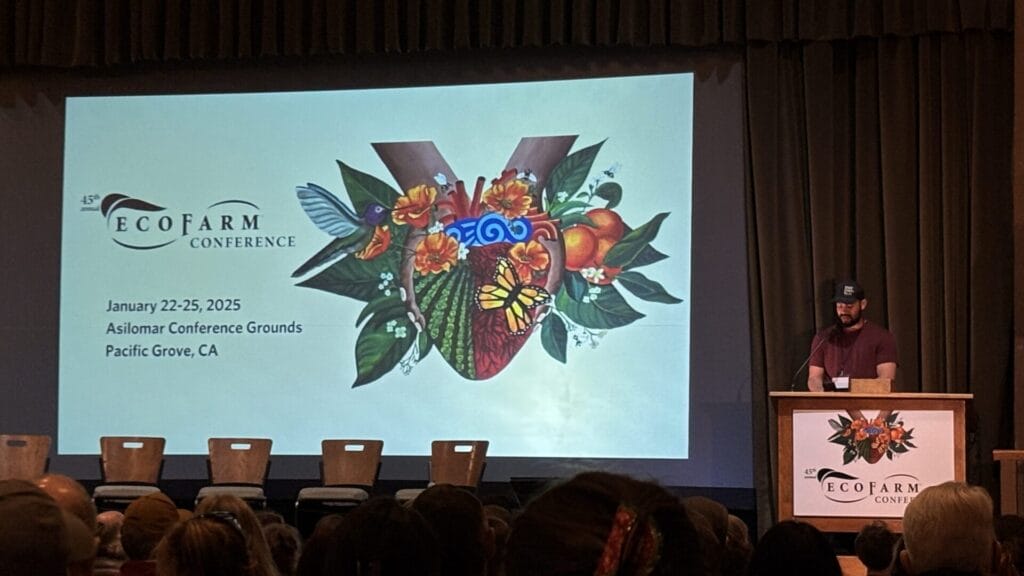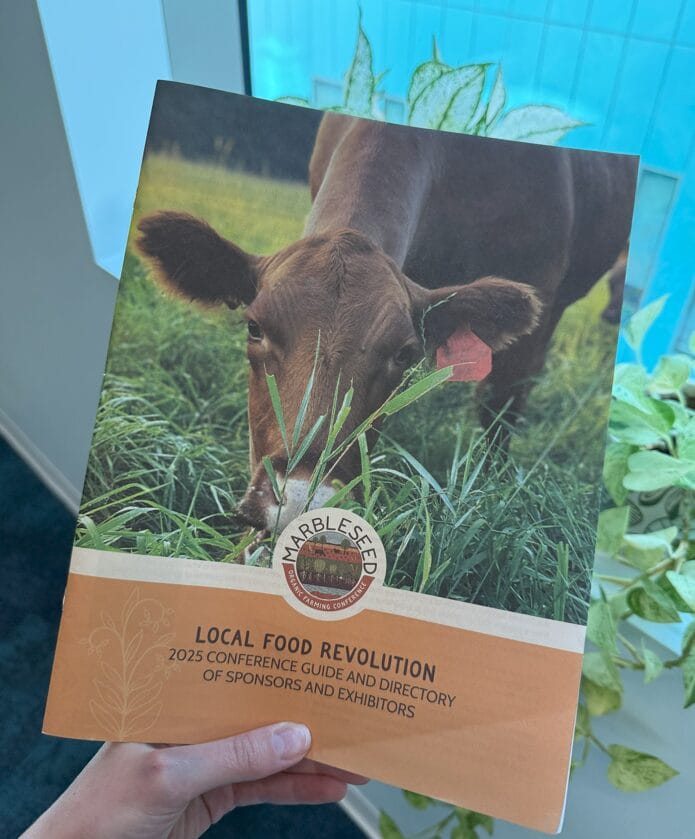By Jane Coghlan, Senior Communications Specialist, and Rylie Lewis, Research Specialist

This winter, staff from the Swette Center for Sustainable Food Systems traveled to two of the country’s most influential gatherings for organic and sustainable agriculture: the 45th annual EcoFarm Conference in California and the Marbleseed Organic Farming Conference in Wisconsin. As Arizona State University continues to lead in sustainability innovation and education, the Swette Center’s presence at these events reinforced its commitment to driving food systems transformation. From presenting on the Arizona Transition to Organic Partnership Program to learning from farmers and advocates on the frontlines, the team returned energized and inspired by the collective momentum toward a more sustainable future for food and agriculture.
Conversations on organic
For more than four decades, the EcoFarm Conference has convened a diverse community of organic farmers, advocates, researchers, and policy leaders committed to advancing the sustainability of food systems. This year’s 45th annual gathering was no exception, drawing over a thousand participants for workshops, panels, and discussion groups that tackled some of the most pressing and complex topics in organic agriculture today.
Among the most spirited conversations was the ongoing effort to define “regenerative agriculture” for California state policy. A recently finalized recommendation from the California State Board of Food and Agriculture proposes a framework for how the term should be used in programs and funding. A panel of stakeholders involved in shaping this definition underscored the importance of including organic agriculture at its core. While the state has set an ambitious target of reaching 10% organic acreage by 2030, many attendees raised the question: Will the regenerative label be a help or a distraction towards this goal?
At its heart, the organic movement has always been rooted in a return to soil health and this commitment rang true throughout the conference. Sessions centered on reducing dependence on synthetic fertilizers and pesticides, with speakers like Dr. Miguel Altieri, an attendee of EcoFarm’s first conference, championing biodiversity as a tool for natural pest management.
Debate around the USDA Organic label also surfaced, particularly regarding whether hydroponic systems should qualify. In a panel featuring Kelly Damewood, CEO of California Certified Organic Farmers and Linley Dixon, co-director of the Real Organic Project, participants wrestled with the meaning of “soil-grown” in an era of soilless technologies. While CCOF emphasized the broader range of soilless systems such as mushrooms, Real Organic Project argued that hydroponics lacks the nutrients and benefits of soil-grown organic foods.
Farm policy was another focal point. In a discussion led by the Organic Farmers Association, concerns from producers surfaced around the delayed reauthorization of the Farm Bill and the loss of organic cost-share funding in the current extension.
Additionally, Arizona’s own Gary Nabhan offered a sobering reminder that the challenges of climate change are no longer theoretical. Speaking about farming in hot, arid climates, Nabhan described these regions as a living laboratory for the future of agriculture. He noted that climate disruptions such as prolonged drought and increased wildfire frequency are not exceptions, but the new normal for producers in California and beyond.

Shortly after EcoFarm, Swette Center staff traveled north for the Marbleseed Organic Farming Conference, another cornerstone gathering for organic producers. With a strong focus on practical tools and farmer-centered learning, Marbleseed offered three days of sessions on everything from grafting fruit trees and improving soil health to building wealth on the farm and selling farm-to-school. Conversations around the intersection of organic and regenerative agriculture also continued at Marbleseed. In a well-attended session, participants discussed the similarities and differences between the two movements, brainstorming opportunities for alignment and collaboration.
Policy remained top of mind at Marbleseed. A session co-hosted by the Ohio Ecological Food and Farm Association and the National Organic Coalition urged producers to engage directly with their members of Congress, emphasizing the power of sharing personal stories to influence agricultural policy. Another session from USDA’s Natural Resources Conservation Service provided clarity on financial and technical assistance available to organic and transitioning producers.
Looking forward
As the Swette Center continues to engage in national conversations and projects around organic agriculture, attending the EcoFarm Conference and the Marbleseed Organic Farming Conference provided a valuable opportunity to listen, learn, and contribute to shaping what comes next.
At both gatherings, soil health was a central theme, seen not only as a foundational principle of organic agriculture but as a crucial pathway to resilient productivity. Producers shared their experiences with practices such as rotating crops, planting polycultures, and experimenting with varietal mixes of the same species to improve soil health and the overall ecosystem on their farm.
Equally important was the shared recognition that the future of sustainable agriculture depends on broadening public understanding of food systems. Across sessions, speakers emphasized the need to build bridges between agricultural communities and everyday consumers. In the final EcoFarm keynote, Charlene Eigen-Vasquez captured this spirit, urging attendees to "share our spaces" and "bring in the little ones" to cultivate curiosity, connection, and ultimately, community health.